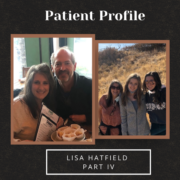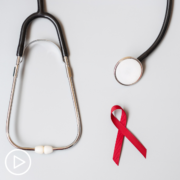Diagnosed with Myeloma? Why to See a Specialist and What to Expect
Diagnosed with Myeloma? Why to See a Specialist and What to Expect from Patient Empowerment Network on Vimeo.
Beth Faiman, a nurse practitioner specializing in multiple myeloma, provides insight into her relationships with patients and the importance of seeking a second opinion with a specialist, even for just a single consultation.
Beth Faiman is a nurse practitioner in the department of hematologic oncology at Cleveland Clinic. More about this expert here.
See More From The Pro-Active Myeloma Patient Toolkit
Related Resources

|
Should You Consider a Second Opinion? Advice From a Myeloma Advocate |
Transcript:
Beth Faiman:
So, my role in treating patients with multiple myeloma is very variable. So, I am a member of a treatment team. I have doctors that I work with, as well as nurses, other nurse practitioners, and social workers.
Sometimes I’m the first face that patients will see when they come to the cancer center. And hopefully, I’ll be fortunate to follow them along with their treatment trajectory.
Some of the other things that I do for patients who have multiple myeloma — I’m involved in the diagnosis and management of their care. I am responsible for obtaining and reviewing their laboratory results at each visit, and if they have a certain symptom that needs to be controlled, I am oftentimes the one that they call or reach out to for some answers.
I think it’s very important for patients to meet with a myeloma specialist at least once. I understand there are a lot of barriers from transportation to finances to just not feeling comfortable with going to an outside institution. But working at a major center which focuses on multiple myeloma for the last 20-plus years, I can really see the value in even just getting an opinion.
So, one of the things I try to encourage is for patients to come and meet with us once or twice because not only are we educating the community physician, but we’re also partnering in their care. So, if they’re getting an injection once or twice weekly, we can see them every couple months, review their laboratory values, and they can get care closer to home. And so, there’s that partnership that forms and then you’re not only educating the patient, but you’re oftentimes educating the community physician or provider that might only see one or two myeloma patients in a year.
So, when patients come to me all they know is that they’re in a cancer center. Oftentimes they have to go on whatever information they’ve been told. I see consultations independently at the Cleveland Clinic so sometimes they’ve been told by their outside physician or nurse practitioner that they might have a blood cancer. Sometimes they fall into a category of patients that have what’s called MGUS or monoclonal gammopathy, so these individuals might not even need treatment forever.
Others might have what’s called smoldering myeloma, which is a different second level, and those patients might need treatment within two to five years. But for those that have been told they have multiple myeloma, there’s a myriad of emotions, and oftentimes I like to take time, share with them first what I know about their case, get time to know them on a one-on-one basis. What they like, what they don’t like, what they do for a living, their hobbies. Because you’re building a relationship.
You might be with that patient for many, many years. So, taking the time to let them know what I know about their case, finding out about themselves, and then pooling it all together with what we need to do now, with this information is oftentimes a good way to start a relationship with the patient and their caregiver.












